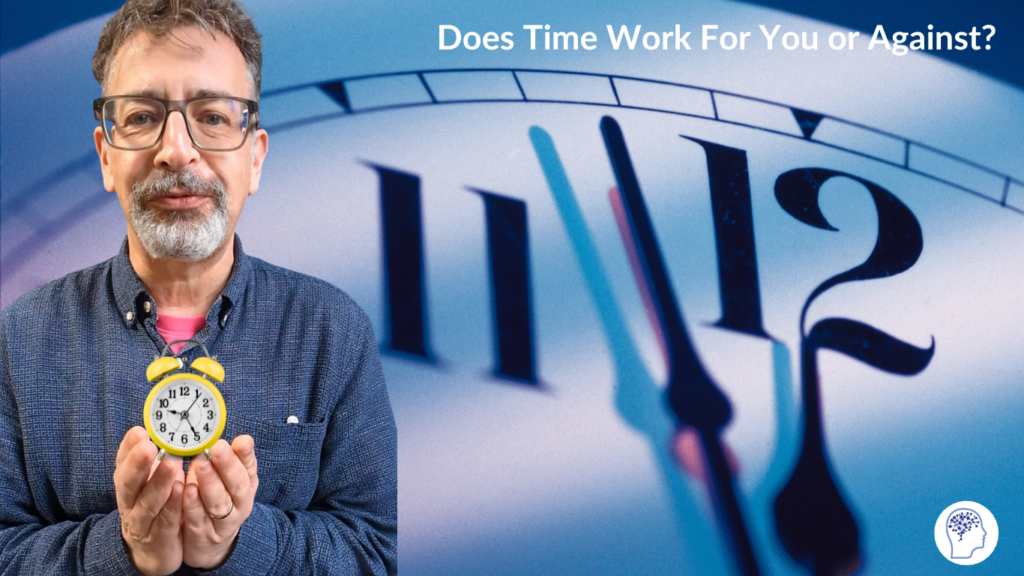Does time work for you or against?
Get time on our side to manage ourselves more effectively
As the clocks go back this weekend marking an end to British Summer Time and reverts to Greenwich Mean Time we can look forward to more sunlight in the mornings along with getting an extra hour in bed. How do you feel about this and does time work for you or against you?
In Business, its either our friend or foe. The golden factor which cannot be altered, we only have a fixed amount of hours in a day to do all that needs to be done. What’s consistently on the list of top challenges business owners face? Time!
Are you more in the moment, just in time or even behind time? Are you always ‘on the minute’ to get to meetings, events or dates? When your teenager says in response to tidying up their room “I’ll do it in a minute” do they really?
Or do you care about being ahead of time and hate being late when meeting friends, going to appointments, dates or events? What happens if you get stressed, is it in relation to time?
Not Enough Hours In The Day!
Who says they “don’t have enough time” or there’s “just not enough hours in the day?” I always wonder what they might do with extra hours – if there were any. I hear this from Clients who are Coaches, Leaders and Business Owners most of whom have completed various courses in time management. For those of us who work for ourselves who may not have a team, the challenge of covering all the areas of the business (the right areas) can be significant in what we spend our precious time on. This requires a flexibility of mindset to ensure balance and maintain focus on direction of travel as well as understanding our relationship with time.
What Is Our Relationship With Time?
For some of us it seems very close to us (in its proximity), meaning we take notice of ‘now’ in the moment and as near as before and after. Events which are further away in relation to the past or future are not as relevant as is now.
How is this a problem? As we are more in the moment it can be really challenging to be on time, no matter what we do such as setting alarms, moving clocks forward, we can still end up on the minute or turning up after events have started. This can be frustrating in work and life. Maybe some friends know this and even arrange to meet you earlier than stated. Just think about all the energy that’s invested into the last minute rush, it can be so draining!
There are positives; a closer relationship with time is extremely useful for crises and immediate responses requiring action. For those in fast paced roles (for example working with emergencies) and those in business, being comfortable making immediate, decisive responses can make the difference.
For others, time is further away from us (in its proximity) which allows us to take more notice of past, present and future, we call this ‘through time’.
How is this a problem? It can be challenging when planned events don’t go to plan and an immediate response is required. As we take more notice of time we can find our attention focused on events from the past or future to the detriment of our wellbeing, anxiety for example. In comparison, there are those who can feel ‘stuck’ living in the past.
There are positives, planning is more important and much easier offering a sense of control. From a business and leadership perspective being prompt for meetings and appointments in the western hemisphere is generally expected. How would the health service run if appointments were not attended when agreed (or as near as). First impressions count on dates, what if you were late for your first on or off line date? (What if you were both late – something in common!) Birthdays, anniversaries and other significant events are less likely to be missed.
How Can We Make A Difference?
Good news is it’s not black and white as we all have our own relationship with time so we can have some characteristics of both. Some of us adapt and learn to operate using both depending on the context we are in and some of us can struggle to. As students on our NLP Coach Practitioner Training work on themselves during the course, they discover their relationship with time and using skills and knowledge during the Time Line Therapy™ certification part of the course, can change it accordingly to suit. Just think how this can help you if you are frustrated by being late for meetings no matter what methods and multiple alarms you employ or alternatively if you are frustrated by not being able to be present in relationships at home, when at work or in sport.
It can be beneficial to develop our awareness and understanding to spend more time on the opposite approach to stretch our flexibility. It may be that some of us do this already creating a coping strategy if work or home requires the opposite of our usual approach. For those of us who are ‘in time’ using the opposite approach can be beneficial. Weddings, family routines, school run, taxiing children to events, all require some form of organisational planning rather than a more stressful last minute approach. The key is to create some distance between yourself and time to be able to take in more of the past, present and future. Ask yourself questions about events and when they are due to occur to help focus attention and take more. This can work at home as well as work, anything from when the laundry needs doing, bills paying through to events such as festivities.
For those of us who are ‘through time’ (able to see more of the past, present and future) it can be extremely liberating to get up real close. We can do this disconnecting ourselves and devices from time. If going on holiday, take the watch off, avoid using other such devices, off. This can also work for weekends, whenever is the last working day take the opportunity to ‘disconnect’ from your devices as soon as you have finished and go with the flow!

Time Line Therapy®
Time Line Therapy® is an approach based upon our relationship with time and the connection to our major negative emotions. We train our coach students in this transformational approach as part of our ABNLP accredited 4 in 1 NLP Coach Practitioner Training to use at work and in life. This is particularly helpful in overcoming related challenges such as anxiety, worry, stress, fears, phobias, past limiting decision and releasing emotional baggage (Anger, Sadness, Fear, Hurt, Guilt). Helping us to regain wasted energy and find balance.

